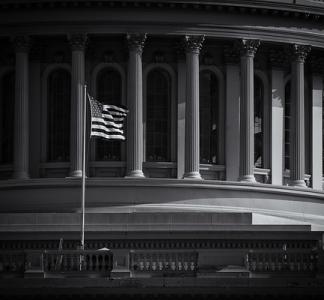New Congress’ first order of business: A clearance sale on public lands

Speaker of the House Mike Johnson at a private political fundraiser.
Gage Skidmore via Flickr
Lawmakers set stage to easily sell off public lands
After a slightly bumpy Speaker of the House selection, the 119th Congress is officially underway, and it’s wasted no time in setting up rules to sell off public lands in the year ahead.
The first order of business for the House of Representatives at the beginning of any new term is adopting a rules package that dictates nearly every aspect of the body’s operations—from the structure of its sessions to its sundry offices and staff. But the implications of these rules go far beyond the House itself, since they can affect what legislation can move through the body and how it does so.
On January 3, just after the start of the term, the razor thin Republican majority passed several alarming changes to the rules—including disheartening and regressive rollbacks of equity and inclusion practices. One of the new rules is a change in accounting policies that makes it much easier for Congress to get rid of our public lands.
“If those lands get sold off, given to states, you’re going to see large privatization.”
In short, the rule change states that the House does not need to account for lost revenue if it gives federal public lands over to states or other interests, rendering them as having no monetary value in budgetary considerations. This move effectively puts “[our] public lands on the clearance rack,” to quote our Senior Director of Government Relations Lydia Weiss, and is “the logical first step in a campaign to expedite sale of those lands.”
We’ve seen moves from this very playbook before. In 2017, the House that paved the way for then Utah Rep. Jason Chaffetz to introduce legislation that would have sold off 3.3 million acres of public lands. That effort was immensely unpopular and a catastrophic failure—after fiery criticism and revolt in his home state Chaffetz was forced to withdraw his legislation without it ever seeing a vote.
Despite what the proponents of this change may claim, this move only has one logical end: selling public lands off to the highest bidder. Make no mistake, public lands sell-offs can only hurt communities and the environment alike. As our Campaign Director Michael Carroll told The New York Times, “If those lands get sold off, you’re going to see large privatization… loss of access and large-scale development.”
This is an unfortunate start to a new Congress and new year—especially as the incoming Trump administration prepares to take office with a stated commitment to rapidly roll back environmental protections and boost drilling. But despite these setbacks, the vast majority of Americans still consistently support public lands and conservation. Regardless of how lawmakers angle their attacks on our public lands, they will undoubtedly continue to face a losing battle with their constituents in the court of public opinion. With your support, we stand ready to face these attacks down as they come.



